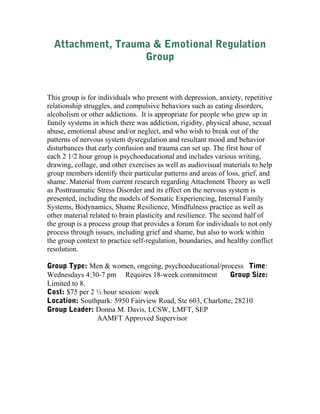AttachmentTramaEmotionalRegGroup
•Download as DOC, PDF•
0 likes•27 views
This group focuses on helping individuals with depression, anxiety, relationship issues, and addictive behaviors by addressing attachment issues, trauma, and emotional dysregulation that can result from childhood abuse or neglect. The first hour of the weekly 2.5 hour group involves psychoeducation, exercises, and materials about attachment theory, post-traumatic stress disorder, and models for improving regulation. The second part is a process group where members can work through issues like grief and shame, and practice self-regulation, boundaries, and conflict resolution. The group is for men and women, requires an 18 week commitment, is limited to 8 people, and costs $75 per session.
Report
Share
Report
Share

Recommended
Recommended
More Related Content
Similar to AttachmentTramaEmotionalRegGroup
Similar to AttachmentTramaEmotionalRegGroup (20)
counselling psychology special areas in counseling

counselling psychology special areas in counseling
Clinical Psychology. By Theresa Lowry-Lehnen. Lecturer of Psychology.

Clinical Psychology. By Theresa Lowry-Lehnen. Lecturer of Psychology.
AttachmentTramaEmotionalRegGroup
- 1. Attachment, Trauma & Emotional Regulation Group This group is for individuals who present with depression, anxiety, repetitive relationship struggles, and compulsive behaviors such as eating disorders, alcoholism or other addictions. It is appropriate for people who grew up in family systems in which there was addiction, rigidity, physical abuse, sexual abuse, emotional abuse and/or neglect, and who wish to break out of the patterns of nervous system dysregulation and resultant mood and behavior disturbances that early confusion and trauma can set up. The first hour of each 2 1/2 hour group is psychoeducational and includes various writing, drawing, collage, and other exercises as well as audiovisual materials to help group members identify their particular patterns and areas of loss, grief, and shame. Material from current research regarding Attachment Theory as well as Posttraumatic Stress Disorder and its effect on the nervous system is presented, including the models of Somatic Experiencing, Internal Family Systems, Bodynamics, Shame Resilience, Mindfulness practice as well as other material related to brain plasticity and resilience. The second half of the group is a process group that provides a forum for individuals to not only process through issues, including grief and shame, but also to work within the group context to practice self-regulation, boundaries, and healthy conflict resolution. Group Type: Men & women, ongoing, psychoeducational/process Time: Wednesdays 4:30-7 pm Requires 18-week commitment Group Size: Limited to 8. Cost: $75 per 2 ½ hour session/ week Location: Southpark: 5950 Fairview Road, Ste 603, Charlotte, 28210 Group Leader: Donna M. Davis, LCSW, LMFT, SEP AAMFT Approved Supervisor